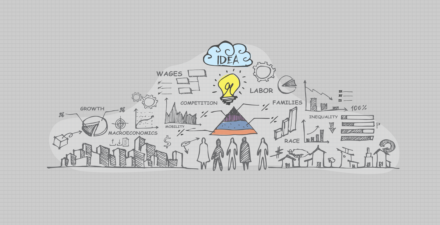Equitable Growth’s new efforts to foster more diversity in grantmaking and new pathways for scholars in the economics profession

The Washington Center for Equitable Growth is increasing its efforts and resources to help tackle the enduring challenges to diversify the economics profession, as well as expanding and strengthening the diversity of lived experiences represented by the scholars with whom we engage.
Equitable Growth mainly provides financial support and professional resources to academics through our grantmaking and Dissertation Scholars program. To expand these resources, we recently developed new programming to support and further the careers of scholars from historically underrepresented and disadvantaged groups in the economics profession, as well as early career researchers.
We are now a host institution for the American Economic Association Summer Economics Fellowship program, which is a partnership of the AEA Committee on the Status of Women in Economics Profession, the Committee on the Status of Minority Groups in the Economics Profession, and host institutions. The program aims to support early career scholars from historically excluded groups in economics. As a host institution, we provide a stipend for a fellow to spend 12 weeks in the summer to conduct research and engage in career and professional development activities.
Our inaugural fellow, Rachel M. B. Atkins, a Provost’s Postdoctoral fellow at the Stern School of Business at New York University, described the experience as “extremely helpful for my career goals both because of [Equitable Growth’s] vast network and also by expanding my horizons regarding the types of available career opportunities for someone with my skillset.”
In addition, Equitable Growth hosted two “brown bag” research presentations: one that featured the two finalists of the AEA Summer Fellowship and the second featuring Atkins. Both brown bags provided these early career scholars an opportunity to receive feedback on their ongoing research from a select group of experts as discussants and audience members, including from our Steering Committee.
Equitable Growth is now participating in the AEA Summer Training program as well, specifically as an “experiential learning” host of two undergraduate students to expose them to professional work outside of academia for Ph.D. economists. The program, currently hosted at Howard University, prepares students for doctoral programs in economics and related disciplines through intensive coursework in microeconomics, math, econometrics, and research methods.
As many as 20 percent of doctorates awarded to students from underrepresented racial and ethnic backgrounds in economics over the past 20 years are graduates of the program. As a host organization, we provide students trainings on topics such as editing and networking, arrange meetings with high-profile economists and members of our academic network, and provide hands-on experience to build skills.
Last year’s experiential learning participants met with U.S. Department of Labor chief economist Janelle Jones and Equitable Growth’s President and CEO Michelle Holder. They also authored columns based on academic papers on intergenerational mobility and neighborhood economic disparities that were published on our website. Patrick Edwards, a student at the Rochester Institute of Technology and the author of the column on neighborhood economic disparities, said of his participation in the program:
I was able to pursue work related to my own interests and interact with staff at all levels of the organization. Despite the short stint, I was able to develop my skills in policy writing for a broad audience and learn about the numerous opportunities available to economists interested in policy work outside of academia.
Equitable Growth also increased our efforts to bring attention to the resources and support we offer to a broader array of scholars, after having worked to make it easier to access information about our grantmaking and what makes for a successful application. To reach a broader audience, for example, in 2021, we engaged more deeply at regional economic conferences, including the Western Economic Association Conference and the Southern Economic Association Conference and will engage this year at the upcoming Midwestern Economic Association Conference. Regional conferences provide valuable ways to introduce funded research and funding opportunities to scholars in various phases of their careers and from an array of backgrounds.
We also organized sessions to provide scholars with information and tips on how to write successful grant proposals. At the Southern Economic Association conference, we organized one such session with the Russell Sage Foundation. The speakers—Stephen Glauser at RSF, Ann Huff Stevens, dean of the College of Liberal Arts at the University of Texas at Austin, Andria Smythe, assistant professor of economics at Howard University, and myself—touched upon how best to foster interdisciplinary collaboration and methodological diversity, increase the number of successful applicants from members of underrepresented groups, and tackle the unique challenges posed by the ongoing pandemic and racial reckoning that have disproportionately impacted communities of color in the United States.
To help expand our network of interdisciplinary scholars, Equitable Growth organized activities at both the Labor and Employment Relations Association Conference and the American Sociological Association annual meeting. At the annual ASA convening, for example, we hosted a professional development workshop on best practices for writing successful grant proposals for research on inequality. The session, led by Equitable Growth’s Academic Programs Director Korin Davis and Mellon/ACLS public fellow Aixa Alemán-Díaz, featured a panel discussion with Elisabeth Jacobs, deputy director of WorkRise at the Urban Institute (and formerly a director at Equitable Growth) and Equitable Growth grantees and accomplished sociologists Nathan Wilmers of the Massachusetts Institute of Technology and Harvard University’s Daniel Schneider. The workshop elevated how different funding opportunities around inequality research provide a host of benefits—monetary and nonmonetary—that range from networking to writing for different audiences and other opportunities with media and policymakers.
David Mitchell, director of government and external relations, provided an overview of our funding opportunities and policy engagement support for scholars at the annual AEA Summer Mentoring Pipeline Conference in June 2021, and Academic Programs Director Davis was a panelist at a professional development session on tips for grant seeking and grant writing at CeMENT’s annual workshop, which is aimed at mentoring women and nonbinary faculty in tenure-track positions in economics.
Another way Equitable Growth is supporting and providing resources for early career scholars is through an “office hours” initiative, whereby interested grant applicants can request a meeting with staff to discuss their research and ask questions specific to their project and situation. The goal is to level the playing field, so scholars outside of our network or with little grant-seeking experience can get input and advice to put together a competitive application.
And there’s more work on the horizon. We are developing a plan to provide more regular mentorship opportunities for early career scholars at academic conferences, as well as more brown bag presentations with members of our academic and policy networks. In addition, Equitable Growth will be piloting free, hands-on grant-writing workshops for economics Ph.D. students at select minority-serving institutions to make our grantmaking and programming more accessible.
Equitable Growth will continue to hold ourselves accountable to cultivating more inclusive pathways by continuing to measure our progress, as well as supporting organizations that steadfastly work to cultivate racial, ethnic, and gender diversity in the economics profession.
Apply to our programs
Equitable Growth is currently accepting applications for the Dissertation Scholars program in response to our annual Request for Proposals. Application materials include a curriculum vitae, a six-page proposal describing your research project, a two-page statement of work, and two letters of recommendation. Dissertation Scholar applicants who are not selected for the program are automatically considered for a doctoral grant.
For the Summer Economics Fellows program, applicants are asked to apply directly through the main AEA program website. Applicants interested in joining Equitable Growth should indicate this preference on the application form. In addition to the application form, a resume and a one-page description of your proposed research is required. We encourage applicants interested in joining Equitable Growth to include goals on how spending time with us would further both your career and research, especially as those goals relate to policy engagement, in the comment box on the application form.
For the Summer Training program, applicants are asked to apply directly through the main AEA program website. Applicants are paired with host institutions by the program organizers.
Summer Training program applications should be received by January 31, 2022. Summer Economics Fellowship program applications should be received by February 1, 2022. Dissertation Scholar applications should be received by January 26, 2022. Doctoral/postdoctoral grant proposals should be received by March 21, 2022.






